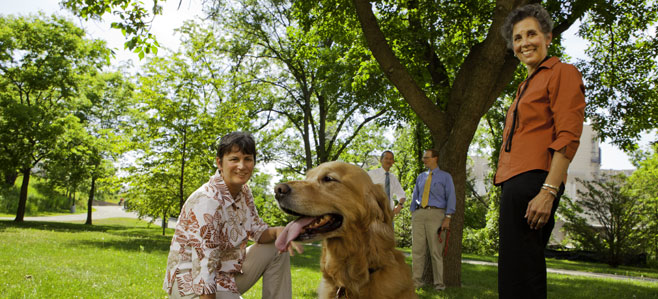
Impressed by the research being done and the care her golden retrievers, including Solar Flare, pictured here, receive at the School of Veterinary Medicine, Linda Nelson, right, and her husband, John, included the School in their estate plans.
Few of us can resist a golden retriever. Big, lovable, friendly. When Linda Nelson visited Malagold Kennels in DeForest, she expected to come home with a female golden retriever puppy. Instead, she met a pack of adults, discovered no puppies were available and was offered part-ownership in one of the boys.
And so a love story began. Big Guy was “stunning, well-behaved, friendly, warm, sweet – and then he flopped over on his back,” Nelson remembered. She was sold, and Big Guy, who turned out to be one of the top 20 goldens in the country, was extraordinary. Today, she and her husband, John, share their home with Malagold’s Solar Flare, their fifth golden. The couple has had as many as three golden retrievers at once, and they give the dogs cowboy hats to wear for birthdays. “We adore our dogs,” Linda Nelson said. “They’re our kids.”
Even after they’re gone, the Nelsons will continue to help the animals they love through their estate gift to the University of Wisconsin School of Veterinary Medicine. After losing two dogs to cancer and watching the breed’s life expectancy decline, the Nelson gift is targeted for cancer research. “This is a huge, huge research project,” said Linda Nelson, who wishes she could spread the word to attract far more money for the project.
“Bequests are critically important to the future of the School of Veterinary Medicine,” Associate Dean Mark Markel said. Ten years ago, the school received about $800,000 a year in gifts; today, the total is closer to $6 million and half of that amount comes from estate gifts. Last year, a $3.5 million estate gift established an endowment that provides about $150,000 for scholarships a year. An earlier estate gift endowed a chair and laboratory in comparable oncology, which advances cancer treatment for animals and humans. “Bequests build a pipeline, so future generations are going to benefit from those gifts,” Markel said.
“I am living evidence that research and innovation can lead to a better and longer life.”
John Nelson
The Nelsons are still young but knew it was time to put their estate in order. They also made bequests to the Nelson Institute for Environmental Studies, named after environmentalist Gaylord Nelson, and the College of Engineering. “It occurred to us we ought to be responsible about these things while we were still able,” John Nelson said. He called it a recognition of the uncertainty of life. “We have had very good and successful lives,” Linda Nelson added. “However, we were forced by health events to recognize that we might not be around for as long as we’d hoped. And frankly, since our great dogs are lousy money managers, we needed to make a plan for our estate.”
Supporting canine cancer research made sense to John Nelson, who was successfully treated for cancer with measures not available 20 years ago. “I am living evidence that research and innovation can lead to a better and longer life,” he said. Chair of the Nelson Institute’s Board of Visitors, Nelson believes the organization will continue to be an environmental foundation for the university community as it works on matters significant to the human condition. In engineering, where he is an adjunct faculty member, Nelson wants to encourage a very good program that the industry finds beneficial.
Making an estate gift is not about being remembered, John Nelson said. “I just think it’s part of a continuum and a responsibility one has when one has means beyond needs.”
